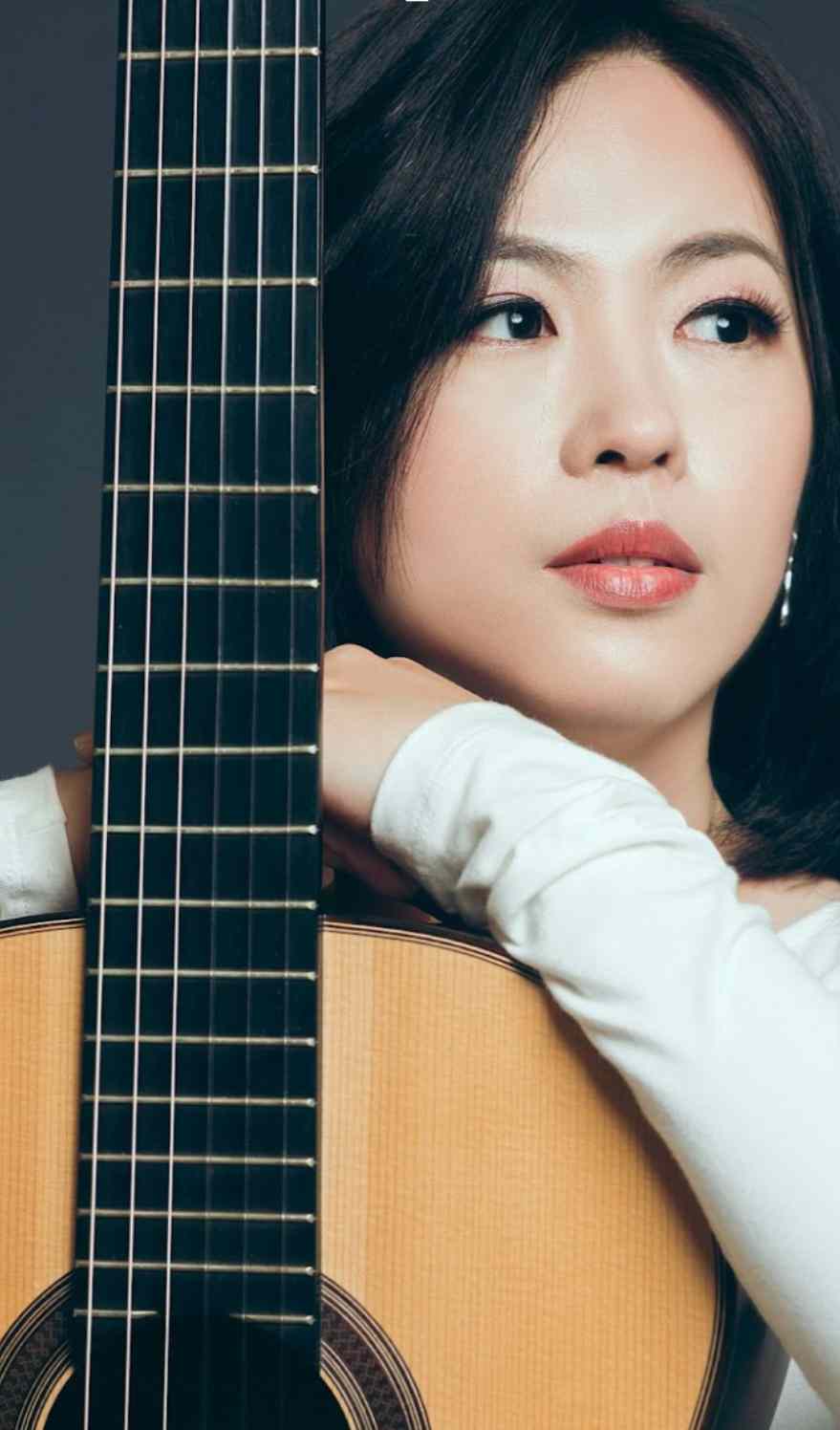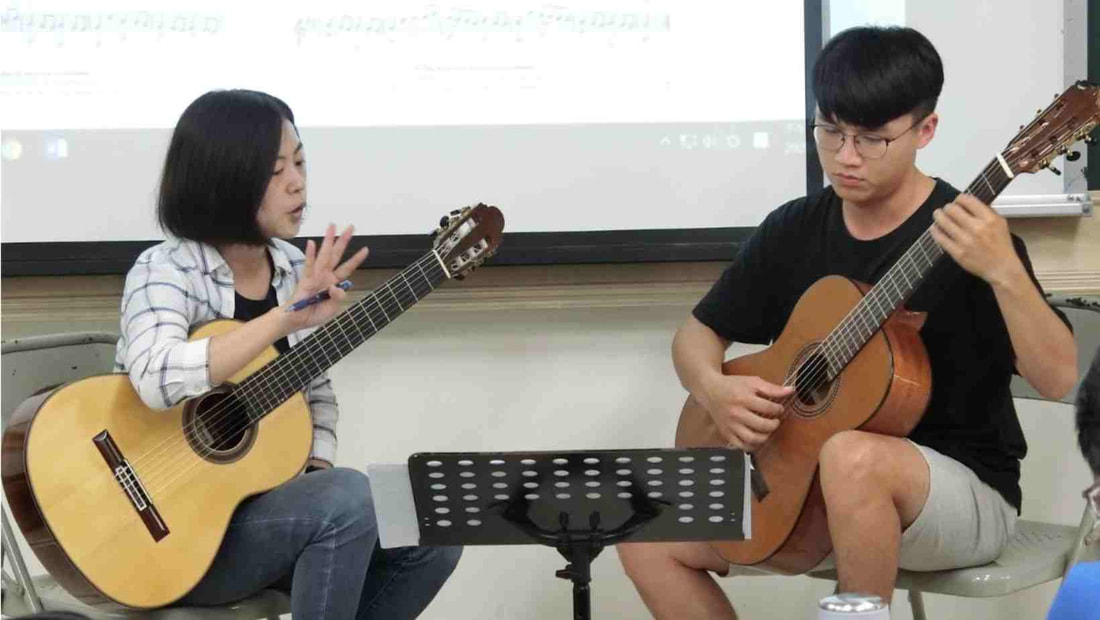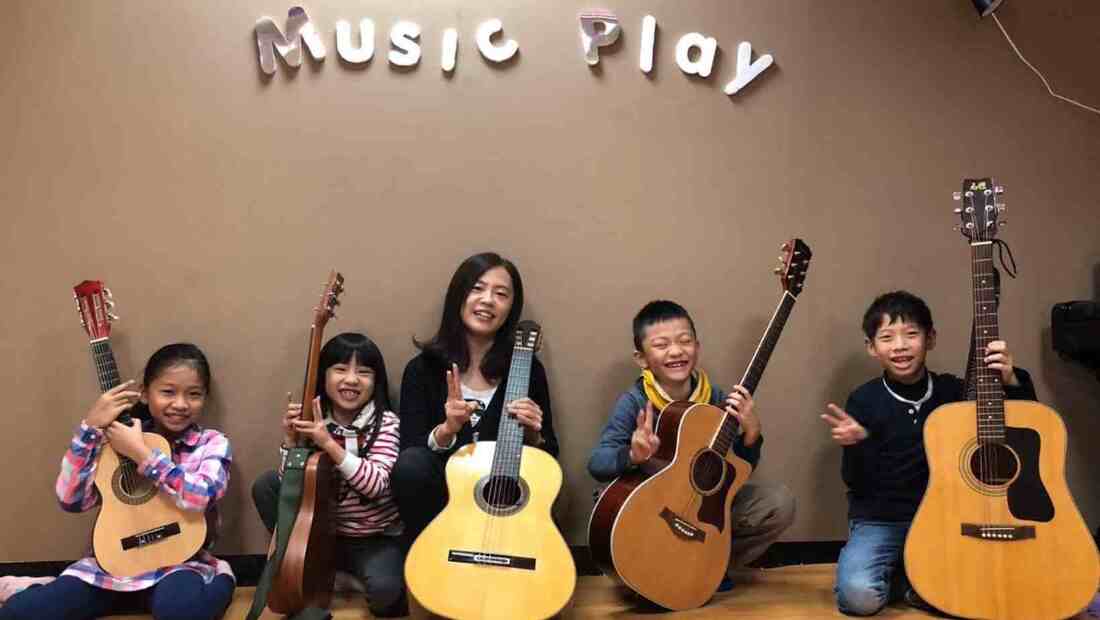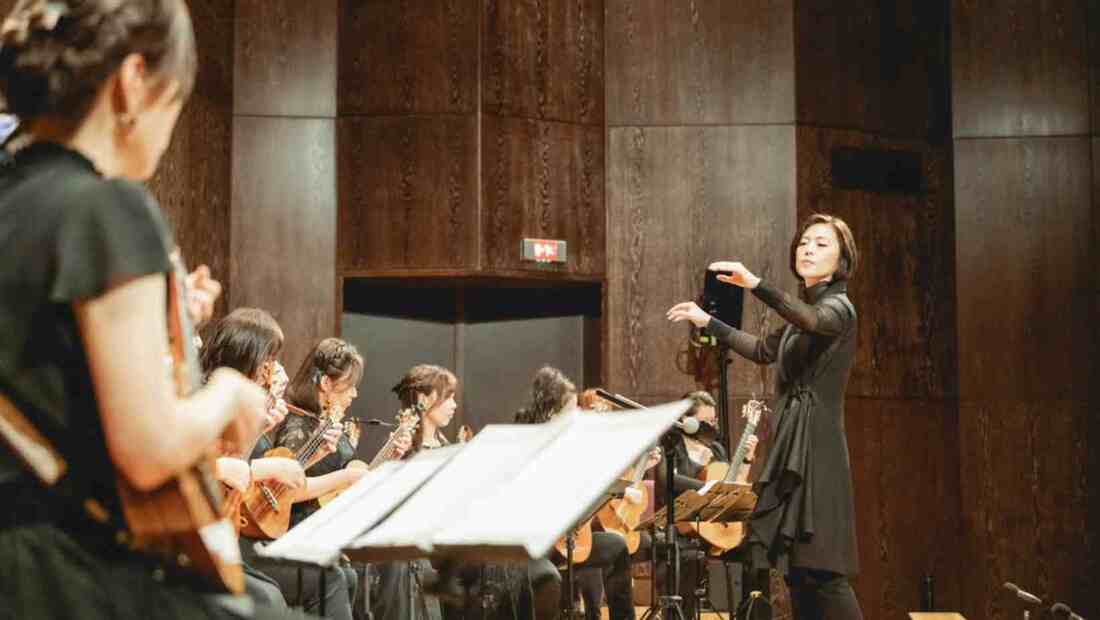“Since the classical guitar is not an orchestral instrument, many classical guitar players have little experience playing with others. I think that playing in an ensemble or an orchestra is the most efficient way to sharpen one’s hearing and also to develop a good sense of rhythm,” She founded the Con Brio Guitar and Ukulele Orchestra because she felt there were too few opportunities for classical guitarists in Taiwan to play together.
“In Taiwan, there are many string, brass, and wind orchestras in schools but no guitar orchestra. It's a pity that guitar players have little chance to play with others and this is also the case for ukulele players. The Con Brio Guitar and Ukulele Orchestra was founded based on this idea: to play music with others,” says Dr Ko Yi-Fang, who is also the orchestra’s director. Con Brio Guitar and Ukulele Orchestra was formed in 2022 and has 25 members currently. Aside from staging an annual concert, the orchestra also performs smaller shows once every three months. The dearth of guitar orchestras has translated to a lack of repertoire for such ensembles, so Dr Ko finds herself having to spend time arranging pieces for the orchestra she helms. Which she feels is important for guitarists, especially beginners. “It’s more interesting to have friends to learn together with,” she explains Dr Ko, who is also assistant professor at Fu-Jen University and Aletheia University. More than that, ensemble playing is very useful for guitarists to develop musically. “A good solo performer is not always a good member player,” explains Dr Ko. “Since the classical guitar is not an orchestral instrument, many classical guitar players have little experience playing with others. Listening carefully is the most important skill when learning music and many guitarists are often lacking in that aspect. I think that playing in an ensemble or an orchestra is the most efficient way to sharpen one’s hearing and also to develop a good sense of rhythm,” she adds. The members of Con Brio can be grateful for two decisions she made which led her to where she is today. BIG DECISIONS One was deciding she preferred the classical guitar over the piano when she was a teenager; the other making that important move to go abroad to further her music education. “I started playing the piano when I was 5. I was taught not only playing skills but also fundamental music theory, sight-reading, sight-singing, ear training and chord accompaniment, among other things,” says Dr Ko. She picked up the guitar only when she was 14, which she feels is “pretty late for learning the guitar”, but her piano and music work in the nine preceding years was excellent preparation that really helped, she adds. In just three years, she had to choose between the two instruments – when making her application to the music department at Fu-Jen University for her Bachelor's degree. “I was 17 years old and it was quite a struggle for me then to choose between the piano and guitar. I had learnt the piano for more than 10 years, but I had to ask myself: which instrument is more natural for me? “I felt that the guitar is a very close friend of mine. The guitar is always with me. I can play the guitar no matter if I am happy or sad; in the day or softly in the night. Just like making friends; you might know a person for a long time but you know you two can’t be close friends. “So, I think I made the right decision – so far.” Then there was the matter of moving abroad to study. She obtained her bachelor’s degree and master’s degree at Taipei’s Fu-Jen University, which meant that, as far as career opportunities went, she could be a schoolteacher in a middle-school in Taiwan. “Studying abroad was going to be a huge burden for my family, so I told myself, it’s just a dream, be realistic. Being a schoolteacher meant a more stable way of making a living, even though it was less attractive to me,” says Dr Ko. But a door to the option of studying abroad opened following a masterclass with Professor Paul Reilly of Indiana’s Ball State University. “Professor Reilly said he could help me obtain a scholarship and assistantship. I plucked up the courage to tell my parents about studying abroad: if I did not get the scholarship and assistantship, then I would stay in Taiwan,” says Dr Ko. We know what happened in that bit of history: She returned home from Ball State University in Indiana, US, with her second masters degree and as a doctor of arts. “For me, interestingly, when you make up your mind, you can create your own road. At least that happened to me,” says Dr Ko, who chaired the Taiwan Guitar Society from 2019 to 2022. The society holds guitar competitions and guitar level exams and organises masterclasses and concerts, budget and opportunity permitting. ON TEACHING Dr Ko teaches in many schools but teaches private lessons, too, in a small rented studio. She even has a YouTube channel offering important tips and exercises for budding classical guitarists. While she finds great fulfilment in teaching, she also considers it important to the improvement of her own playing. “Sometimes, we are far away from our days as a beginner; so teaching affords me a good chance to review the details. Some playing skills are easy for us but not for students,” she explains. “Besides, I also improve my communication skills while teaching. Performing is about communicating with music; I enjoy teaching not only private individual lessons but also group classes and videos.” In future, she hopes to develop her skills as a conductor for guitar orchestras, but her focus now is on developing repertoire for guitar orchestras, so she is working on her arranging and composing skills. “In my opinion, there will be a proliferation of classical guitar ensembles if there are many pieces that people can get easily. So, I need to focus on developing my writing and arranging skills first.” ON PERFORMING Dr Ko performs regularly, both in solo guitar as well as part of an ensemble or as conductor of the Con Brio Guitar and Ukulele Orchestra. “I prefer to perform solo for the first half and play together with advanced students for the second half. I treasure the moment with others on stage and I want to share the joy with more people. “As a performer, I think I need to learn more about jazz guitar and modern fingerstyle. I learnt the electric guitar for about a year or so several years ago. Different musical styles will definitely improve and expand one’s abilities of Interpretations.” MY KIND OF MUSIC “I spend more time listening to classical music – not only the classical guitar but also the piano and symphonies, among others. I will listen to pop and jazz, too. “I like J.S. Bach’s music, which is extremely difficult for guitar but full of possibilities. I really enjoy finding motifs, counterpoints and inner voices in Bach’s music. Music is alive and Bach’s music proves it. I also love playing Roland Dyens, Leo Brouwer, and Andrew York’s music. Music is about connecting with people. Bach’s music is more like the conversation between me and myself. Dyens, Brouwer and York are masters of storytelling. You can always see the vivid scenes and beautiful colours in their music. I always enjoy playing them and audiences love their repertoire, too.” FAVOURITE GUITARISTS “There are many outstanding guitarists today but my favourite guitarist is Elena Papandreou. She visited Taiwan in 2018 and played Roland Dyens' arrangement of Alfonsina y el Mar. She told us a few stories about the late Dyens before playing and when she played, I just cried while listening. Every single note she played revealed her sadness, of how much she missed him. Music tells a lot without actually saying a word. Another master is Pablo Sainz-Villegas. He visited Taiwan in 2023 and I attended his recitals twice in different cities. His music is full of passion and personal interpretations. You will never feel bored even though it’s the same repertoire. Again, there are so many great maestros in the world. I’m glad that I’m born in an era of plenty of outstanding guitarists.” MY GUITAR “I currently play an Antonio Marin Montero guitar. It has a balanced tone with great volume and quick responsiveness. Among the other outstanding instruments that I’ve played are guitars by Robert Bouchet, Matthias Dammann and Ignacio Fleta.” LEARN THIS PIECE “If there is a piece for the classical guitar that you need to learn, this is it: Romance. Most people know this piece and you’ll connect with the audience, and music is about connection and communication.” |
YOU MAY LIKE
|
OPEN STUDIO
The Classical Guitar Life A 45-minute showcase followed by a short talk + discussion on how the guitar can be a rewarding hobby. Includes explaining matters such as changing strings, guitar cost and maintenance. This programme is suitable for those interested in the classical guitar, including young adults. Registration opens now. |





